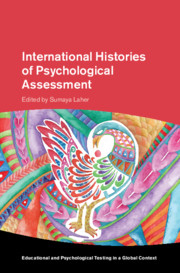Book contents
- International Histories of Psychological Assessment
- Educational and Psychological Testing in a Global Context
- International Histories of Psychological Assessment
- Copyright page
- Contents
- Tables
- Contributors
- Series Editor’s Foreword
- Chapter 1 Histories of Psychological Assessment
- Chapter 2 Psychological Assessment in Southern Africa
- Chapter 3 Psychological Testing and Inclusive Schooling
- Chapter 4 Psychological Assessment in West Africa
- Chapter 5 Psychological Assessment in the Levant
- Chapter 6 The History of Assessment in the Nordic Countries
- Chapter 7 Key Episodes in The History of Testing in Central Western Europe
- Chapter 8 The Beginnings of Psychological Assessment in Spain and Portugal
- Chapter 9 Histories of Psychological Assessments in the United Kingdom
- Chapter 10 The Early History of Psychological Testing in Eastern Europe and Russia
- Chapter 11 Hearing the Untold
- Chapter 12 History of Psychological Assessment in Southern Asia
- Chapter 13 The History of Psychological Testing in East Asia
- Chapter 14 Psychological Assessment and Testing in Malaysia and Singapore
- Chapter 15 A Brief History of Testing and Assessment in Oceania
- Chapter 16 Psychological Assessment in South America
- Chapter 17 Historical Development of Psychological Assessment in the Caribbean
- Chapter 18 The History of Psychological Assessment in North America
- Chapter 19 Looking Back, Moving Forward
- Index
- References
Chapter 3 - Psychological Testing and Inclusive Schooling
Issues and Prospects in Central Africa
Published online by Cambridge University Press: 28 July 2022
- International Histories of Psychological Assessment
- Educational and Psychological Testing in a Global Context
- International Histories of Psychological Assessment
- Copyright page
- Contents
- Tables
- Contributors
- Series Editor’s Foreword
- Chapter 1 Histories of Psychological Assessment
- Chapter 2 Psychological Assessment in Southern Africa
- Chapter 3 Psychological Testing and Inclusive Schooling
- Chapter 4 Psychological Assessment in West Africa
- Chapter 5 Psychological Assessment in the Levant
- Chapter 6 The History of Assessment in the Nordic Countries
- Chapter 7 Key Episodes in The History of Testing in Central Western Europe
- Chapter 8 The Beginnings of Psychological Assessment in Spain and Portugal
- Chapter 9 Histories of Psychological Assessments in the United Kingdom
- Chapter 10 The Early History of Psychological Testing in Eastern Europe and Russia
- Chapter 11 Hearing the Untold
- Chapter 12 History of Psychological Assessment in Southern Asia
- Chapter 13 The History of Psychological Testing in East Asia
- Chapter 14 Psychological Assessment and Testing in Malaysia and Singapore
- Chapter 15 A Brief History of Testing and Assessment in Oceania
- Chapter 16 Psychological Assessment in South America
- Chapter 17 Historical Development of Psychological Assessment in the Caribbean
- Chapter 18 The History of Psychological Assessment in North America
- Chapter 19 Looking Back, Moving Forward
- Index
- References
Summary
This chapter sets out to provide a comparative perspective on seemingly incompatible global agendas and efforts to include all children in the general school system, thus reducing exclusion. With an examination of the international testing culture and the politics of inclusion currently permeating national school reforms, this chapter intends to raise a critical and constructive discussion of these movements, which appear to support one another, yet simultaneously offer profound contradictions. The chapter will include a brief history of psychological testing in Central Africa and identify types of psychological tests in use in Central Africa as well as the issues and problems that arise when making use of such psychological tests at both national and local levels. It will shed light on new possibilities for educational improvements in global and local contexts.
Keywords
- Type
- Chapter
- Information
- International Histories of Psychological Assessment , pp. 47 - 58Publisher: Cambridge University PressPrint publication year: 2022

